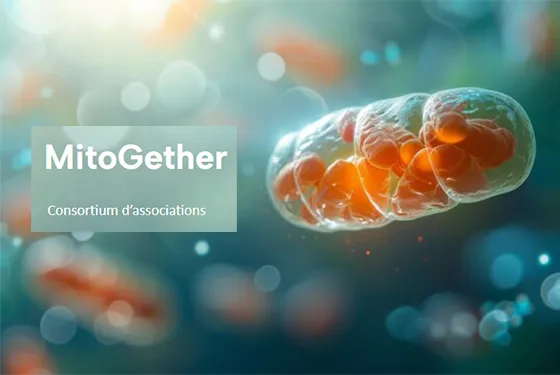Mitogether.com: the new reference website on genetic mitochondrial diseases

To celebrate World Mitochondrial Disease Week, the “MitoGether” consortium, uniting 12 patient and family associations, is launching Mitogether.com. This new portal aims to become the leading online resource for everyone affected by a genetic mitochondrial disease: patients, families, healthcare professionals, researchers, and pharmaceutical industry stakeholders.
Mitochondrial diseases: rare and heterogeneous genetic disorders
There are more than 400 forms of genetic—or primary—mitochondrial diseases linked to mutations in genes directly involved in the functioning or maintenance of mitochondria. Mitochondria are unique in that they have their own genome and are therefore influenced by two genomes: the nuclear genome, with its 23 pairs of chromosomes contained in our cell nuclei, and the mitochondrial DNA within the mitochondria themselves, which explains the high degree of heterogeneity of these diseases.
These diseases affect approximately 1 in 4,300 people in Europe, and at least 16,000 people in France.
These genetic mutations cause dysfunction in the mitochondria, the power house of the cell present in almost all of our cells, and are the cause of diseases affecting vision, brain, muscles, metabolism, and more. Mitochondrial research has made major progress in recent years, and as our understanding of these diseases and their management advances, the first innovative therapies are emerging for some of them.
MitoGether: a consortium initiated by AFM-Téléthon
In order to centralize knowledge and facilitate information searches (monitoring, care, research, clinical trials, etc.), 12 French associations of people affected by primary mitochondrial diseases, with the help of the AFM-Telethon, have created MitoGether.
Laurence Tiennot-Herment, President of AFM-Téléthon, points out : "In 2022, we organised MitoNice, the first conference dedicated to advances in mitochondrial diseases research. During the conference, several experts emphasised the urgent need to structure and raise awareness of information about these diseases, as clinical trials in this field were about to begin.
This situation was unacceptable to our association, AFM-Téléthon, so we held numerous discussions with other patient associations. The idea of creating an information portal designed to raise awareness among French patients and clinicians internationally began to emerge.
www.mitogether.com is now online and will be a valuable resource for the entire mitochondrial disease community."
The consortium has set itself the following objectives:
- Better inform those affected: understand mitochondrial disease, find a local center of expertise to receive care from specialists, identify the relevant patient advocacy group, follow and understand ongoing research, be notified of trials in preparation or recruiting participants... all this information helps people find their way and receive better care.
- Better inform and support doctors and researchers: keep up with the latest knowledge and medical-scientific publications, learn about optimal care, be alerted to current and upcoming studies and clinical trials, and available research support, identify relevant scientific events and conferences for disseminating information... All of these are valuable resources for professionals.
- Better inform pharmaceutical companies about the specific characteristics and
strengths of France and its centers of expertise in order to accelerate the development of tomorrow's treatments: gain a thorough understanding of the population affected by mitochondrial disease in France, understand how patient care and research are organized, identify key patient advocacy groups ,mitochondrial experts and clinicians, and get in touch with them... An asset for accelerating the availability of mitochondrial treatments.
